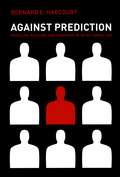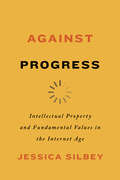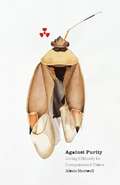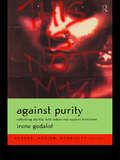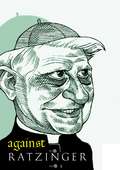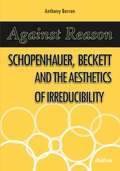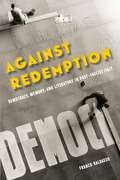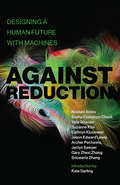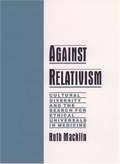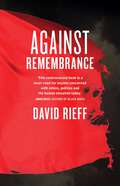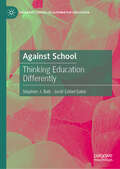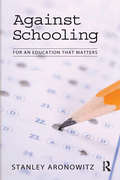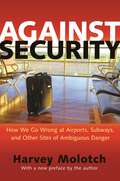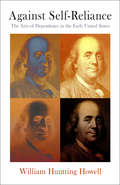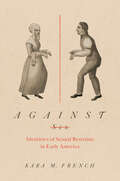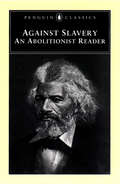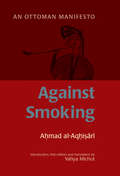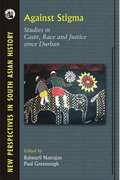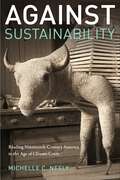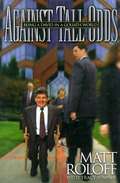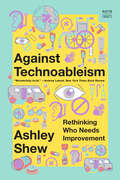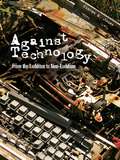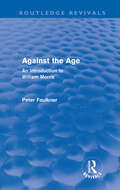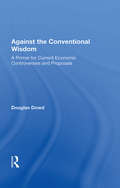- Table View
- List View
Against Prediction: Profiling, Policing, and Punishing in an Actuarial Age
by Bernard E. HarcourtFrom random security checks at airports to the use of risk assessment in sentencing, actuarial methods are being used more than ever to determine whom law enforcement officials target and punish. And with the exception of racial profiling on our highways and streets, most people favor these methods because they believe they’re a more cost-effective way to fight crime. In Against Prediction, Bernard E. Harcourt challenges this growing reliance on actuarial methods. These prediction tools, he demonstrates, may in fact increase the overall amount of crime in society, depending on the relative responsiveness of the profiled populations to heightened security. They may also aggravate the difficulties that minorities already have obtaining work, education, and a better quality of life—thus perpetuating the pattern of criminal behavior. Ultimately, Harcourt shows how the perceived success of actuarial methods has begun to distort our very conception of just punishment and to obscure alternate visions of social order. In place of the actuarial, he proposes instead a turn to randomization in punishment and policing. The presumption, Harcourt concludes, should be against prediction.
Against Progress: Intellectual Property and Fundamental Values in the Internet Age
by Jessica SilbeyWhen first written into the Constitution, intellectual property aimed to facilitate "progress of science and the useful arts" by granting rights to authors and inventors. Today, when rapid technological evolution accompanies growing wealth inequality and political and social divisiveness, the constitutional goal of "progress" may pertain to more basic, human values, redirecting IP's emphasis to the commonweal instead of private interests. Against Progress considers contemporary debates about intellectual property law as concerning the relationship between the constitutional mandate of progress and fundamental values, such as equality, privacy, and distributive justice, that are increasingly challenged in today's internet age. Following a legal analysis of various intellectual property court cases, Jessica Silbey examines the experiences of everyday creators and innovators navigating ownership, sharing, and sustainability within the internet eco-system and current IP laws. Crucially, the book encourages refiguring the substance of "progress" and the function of intellectual property in terms that demonstrate the urgency of art and science to social justice today.
Against Purity: Living Ethically in Compromised Times
by Alexis ShotwellThe world is in a terrible mess. It is toxic, irradiated, and full of injustice. Aiming to stand aside from the mess can produce a seemingly satisfying self-righteousness in the scant moments we achieve it, but since it is ultimately impossible, individual purity will always disappoint. Might it be better to understand complexity and, indeed, our own complicity in much of what we think of as bad, as fundamental to our lives? Against Purity argues that the only answer—if we are to have any hope of tackling the past, present, and future of colonialism, disease, pollution, and climate change—is a resounding yes. Proposing a powerful new conception of social movements as custodians for the past and incubators for liberated futures, Against Purity undertakes an analysis that draws on theories of race, disability, gender, and animal ethics as a foundation for an innovative approach to the politics and ethics of responding to systemic problems. Being against purity means that there is no primordial state we can recover, no Eden we have desecrated, no pretoxic body we might uncover through enough chia seeds and kombucha. There is no preracial state we could access, no erasing histories of slavery, forced labor, colonialism, genocide, and their concomitant responsibilities and requirements. There is no food we can eat, clothes we can buy, or energy we can use without deepening our ties to complex webbings of suffering. So, what happens if we start from there? Alexis Shotwell shows the importance of critical memory practices to addressing the full implications of living on colonized land; how activism led to the official reclassification of AIDS; why we might worry about studying amphibians when we try to fight industrial contamination; and that we are all affected by nuclear reactor meltdowns. The slate has never been clean, she reminds us, and we can&’t wipe off the surface to start fresh—there&’s no fresh to start. But, Shotwell argues, hope found in a kind of distributed ethics, in collective activist work, and in speculative fiction writing for gender and disability liberation that opens new futures.
Against Purity: Rethinking Identity with Indian and Western Feminisms (Gender, Racism, Ethnicity Ser.)
by Irene GedalofAgainst Purity confronts the difficulties that white Western feminism has in balancing issues of gender with other forms of difference, such as race, ethnicity and nation. This pioneering study places recent feminist theory from India in critical conversation with the work of key Western thinkers such as Butler, haraway and Irigaray and argues that, through such postcolonial encounters, contemporary feminist thought can begin to work 'against purity' in order to develop more complex models of power, identity and the self, ultimately to redefine 'women' as the subject of feminism.Theoretically grounded yet written in an accessible style, this is a unique contribution to ongoing feminist debates about identity, power and difference.
Against Ratzinger
by Antony ShugaarPublished anonymously in Italy on the one-year anniversary of Ratzinger's election to the papacy, Against Ratzinger caused a national stir and immediately shot onto bestseller lists. Now America, the home of over 67 million Catholics, will have the opportunity to wrestle with this insightful and revealing examination of Pope Benedict XVI. This concise volume analyzes and critiques the pronouncements of Ratzinger. Addressing some of the most dramatic and pressing issues of our time, Against Ratzigner studies the Pope's responses to birth control, abortion, and sexual abuse in the Church. Against Ratzinger charts Ratzinger's rise to power from his arrival in Rome in 1981 and addresses his close relationship with the late Pope John Paul II.
Against Reason: Schopenhauer, Beckett and the Aesthetics of Irreducibility
by Anthony BarronAnthony Barron explores the relationship between the philosophy of Schopenhauer and the forms and themes of Beckett's critical and creative writings. He shows that Beckett's aesthetic preoccupations are consonant with some of Schopenhauer's seminal arguments regarding the arational basis of artistic composition and appreciation and the impotence of reason in human affairs. While Beckett's critical writings are, in places, formidably opaque, this work examines the ways in which such texts can be elucidated when their intertextual affinities with Schopenhauer's arguments are revealed. Using Schopenhauer's thought as a presiding interpretative framework, Barron demonstrates how the widespread presence of philosophical and theological ideas in Beckett's creative texts signifies less about his personal convictions than it does about his authorial aims. He thereby highlights the ways in which discursive ideas were appropriated and manipulated by Beckett for purely literary ends. <P><P>A central contention of this book is that to judge the place of ideas within Beckett's art, we should ignore questions of their theoretical persuasiveness and consider their role as purely aesthetic devices, the value of which is revealed in terms of the existential impact they have upon his characters. In each of the chapters that deal with Beckett's fiction, Barron underscores the artistically energizing tensions that exist between the concepts that Beckett's characters invoke in their attempts to comprehend the import of their experiences and their conative and affective tribulations which invariably prove resistant to such analysis. Here the means by which such conceptual aporias engender semantic potentialities underpin an exploration of Beckett's creative assimilation of rational discourse. While the focus of this publication is upon Beckett's early and middle fiction, which was composed at a time when the relationship between the chaos of quotidian ordeals and the value of rational thought became most acutely relevant for him, numerous cross-references to his dramatic and poetical works are provided in order to highlight the overall significance of these issues within his oeuvre.
Against Redemption: Democracy, Memory, and Literature in Post-Fascist Italy (World War II: The Global, Human, and Ethical Dimension)
by Franco BaldassoWINNER, HELEN AND HOWARD R. MARRARO PRIZE IN ITALIAN HISTORYDiscloses the richness of ideas and sheds light on the controversy that characterized the transition from fascism to democracy, examining authors, works and memories that were subsequently silenced by Cold War politics.How a shared memory of Fascism and its cultural heritage took shape is still today the most disputed question of modern Italy, crossing the boundaries between academic and public discourse. Against Redemption concentrates on the historical period in which disagreement was at its highest: the transition between the downfall of Mussolini in July 1943 and the victory of the Christian Democrats over the Left in the 1948 general elections. By dispelling the silence around the range of opinion in the years before the ideological struggle fossilized into Cold War oppositions, this book points to early postwar literary practices as the main vehicle for intellectual dissent, shedding new light on the role of cultural policies in institutionalizing collective memory. During Italy’s transition to democracy, competing narratives over the recent traumatic past emerged and crystallized, depicting the country’s break with Mussolini’s regime as a political and personal redemption from its politics of exclusion and unrestrained use of violence. Conversely, outstanding authors such as Elsa Morante, Carlo Levi, Alberto Moravia, and Curzio Malaparte, in close dialogue with remarkable but now-neglected figures, stressed the cultural continuity between the new democracy and Fascism, igniting heated debates from opposite political standpoints. Their works addressed questions such as the working through of national defeat, Italian responsibility in World War II, and the Holocaust, revealing how the social, racial, and gender biases that characterized Fascism survived after its demise and haunted the newborn democracy.
Against Reduction: Designing a Human Future with Machines
by Noelani Arista Sasha Costanza-Chock Vafa Ghazavi Suzanne KiteProvocative, hopeful essays imagine a future that is not reduced to algorithms.What is human flourishing in an age of machine intelligence, when many claim that the world&’s most complex problems can be reduced to narrow technical questions? Does more computing make us more intelligent, or simply more computationally powerful? We need not always resist reduction; our ability to simplify helps us interpret complicated situations. The trick is to know when and how to do so. Against Reduction offers a collection of provocative and illuminating essays that consider different ways of recognizing and addressing the reduction in our approach to artificial intelligence, and ultimately to ourselves.Inspired by a widely read manifesto by Joi Ito that called for embracing the diversity and irreducibility of the world, these essays offer persuasive and compelling variations on resisting reduction. Among other things, the writers draw on indigenous epistemology to argue for an extended &“circle of relationships&” that includes the nonhuman and robotic; cast &“Snow White&” as a tale of AI featuring a smart mirror; point out the cisnormativity of security protocol algorithms; map the interconnecting networks of so-called noncommunicable disease; and consider the limits of moral mathematics. Taken together, they show that we should push back against some of the reduction around us and do whatever is in our power to work toward broader solutions.
Against Reform
by John PepallIn Against Reform, John Pepall offers a stringent critique of proposed reforms to Canada's political institutions. Examining electoral reform, an elected or provincially appointed Senate and reduced terms for Senators, fixed election dates, recall, initiative, and parliamentary reform, including 'free votes' and parliamentary confirmation of appointments, Pepall contends that these reforms are ill-conceived and would be harmful.At the root of Pepall's critique is an argument that, in Canada today, too many voters are quick to blame institutions rather than their own conflicting interests and understandings when they do not receive what they want out of government. While considering influential factors such as academic and media bias, political fashion, and the American example, Pepall's unique and highly readable assessment takes aim at the practical and theoretical understandings of reform across party lines.
Against Relativism: Cultural Diversity and the Search for Ethical Universals in Medicine
by Ruth MacklinThis book analyzes the debate surrounding cultural diversity and its implications for ethics. If ethics are relative to particular cultures or societies, then it is not possible to hold that there are any fundamental human rights. The author examines the role of cultural tradition, often used as a defense against critical ethical judgments, and explores key issues in health and medicine in the context of cultural diversity: the physician-patient relationship, disclosing a diagnosis of a fatal illness, informed consent, brain death and organ transplantation, rituals surrounding birth and death, female genital mutilation, sex selection of offspring, fertility regulation, and biomedical research involving human subjects. Among the conclusions the author reaches are that ethical universals exist but must not be confused with ethical absolutes. The existence of ethical universals is compatible with a variety of culturally relative interpretations, and some rights related to medicine and health care should be considered human rights. Illustrative examples are drawn from the author's experiences serving on international ethical review committees and her travels to countries in Africa, Asia, and Latin America, where she conducted educational workshops and carried out her own research.
Against Remembrance
by David RieffIn Against Remembrance, David Rieff provocatively argues that the business of remembrance, particularly of the great tragedies of the past, are policitised events of highly selective memory. Rather than ending injustices, as we expect it to, collective memory in so many cases dooms us to an endless cycle of vengeance. Humanity, he says, simply cannot cope with the true ambivalence of historical events. And if we remember only partially, how can our memories serve us, or our society, as well as we hope?
Against School: Thinking Education Differently (Palgrave Studies in Alternative Education)
by Stephen J. Ball Jordi Collet-SabéThis book invites the reader to think education against, beyond and without the school and its paraphernalia. To think about &‘education&’, rather than schooling, and what kind of education is relevant to and needed now in the complex, difficult and dangerous world we live in. That invitation means testing our limits, questioning and changing ourselves and thinking the practice of education differently. The book is not about tinkering, improving, reforming – it about clearing away the detritus of the school and using the space created to explore education as self-formation and commoning. It will be of interest to scholars and graduate students of alternative education, schooling, educational policy and philosophy, and the sociology of education.
Against Schooling: For an Education That Matters (Radical Imagination Ser.)
by Stanley AronowitzIn Against Schooling, Stanley Aronowitz passionately raises an alarm about the current state of education in our country. Discipline and control over students, Aronowitz argues, are now the primary criteria of success, and genuine learning is sacrificed to a new educational militarism. In an age where school districts have imposed testing, teachers must teach to test, and both teacher and student are robbed of their autonomy and creativity. The crisis extends to higher education, where all but a few elite institutions are becoming increasingly narrowly focused and vocational in their teaching. With education lacking opportunity for self-reflection on broad social and historical dynamics, Against Schooling asks "How will society be able to solve its most pressing problems?" Aronowitz proposes innovative approaches to get schools back on track..
Against Security: How We Go Wrong at Airports, Subways, and Other Sites of Ambiguous Danger - Updated Edition
by Harvey MolotchHow security procedures could be positive, safe, and effectiveThe inspections we put up with at airport gates and the endless warnings we get at train stations, on buses, and all the rest are the way we encounter the vast apparatus of U.S. security. Like the wars fought in its name, these measures are supposed to make us safer in a post-9/11 world. But do they? Against Security explains how these regimes of command-and-control not only annoy and intimidate but are counterproductive. Sociologist Harvey Molotch takes us through the sites, the gizmos, and the politics to urge greater trust in basic citizen capacities—along with smarter design of public spaces. In a new preface, he discusses abatement of panic and what the NSA leaks reveal about the real holes in our security.
Against Self-Reliance
by William Huntting HowellIndividualism is arguably the most vital tenet of American national identity: American cultural heroes tend to be mavericks and nonconformists, and independence is the fulcrum of the American origin story. But in the late eighteenth and early nineteenth centuries, a number of American artists, writers, and educational philosophers cast imitation and emulation as central to the linked projects of imagining the self and consolidating the nation. Tracing continuities between literature, material culture, and pedagogical theory, William Huntting Howell uncovers an America that celebrated the virtues of humility, contingency, and connection to a complex whole over ambition and distinction. Against Self-Reliance revalues and rethinks what it meant to be repetitive, derivative or pointedly generic in the early republic and beyond. Howell draws on such varied sources as Benjamin Franklin's programs for moral reform, Phillis Wheatley's devotional poetry, David Rittenhouse's coins and astronomical machines, Benjamin Rush's psychological and political theory, Susanna Rowson's schoolbooks, and the novels of Charles Brockden Brown and Herman Melville to tease out patterns of dependence in early America. With its incisive critique of America's storied heroic individualism, Against Self-Reliance argues that the arts of dependence were—and are—critical to the project of American independence.
Against Sex: Identities of Sexual Restraint in Early America (Gender and American Culture)
by Kara M. FrenchHow much sex should a person have? With whom? What do we make of people who choose not to have sex at all? As present as these questions are today, they were subjects of intense debate in the early American republic. In this richly textured history, Kara French investigates ideas about, and practices of, sexual restraint to better understand the sexual dimensions of American identity in the antebellum United States. French considers three groups of Americans—Shakers, Catholic priests and nuns, and followers of sexual reformer Sylvester Graham—whose sexual abstinence provoked almost as much social, moral, and political concern as the idea of sexual excess. Examining private diaries and letters, visual culture and material artifacts, and a range of published works, French reveals how people practicing sexual restraint became objects of fascination, ridicule, and even violence in nineteenth-century American culture. Against Sex makes clear that in assessing the history of sexuality, an expansive view of sexual practice that includes abstinence and restraint can shed important new light on histories of society, culture, and politics.
Against Slavery
by VariousAssembles more than forty speeches, lectures, and essays critical to the abolitionist crusade. Features William Lloyd Garrison, Frederick Douglass, Lydia Maria Child, Wendell Phillips, Harriet Beecher Stowe, and Ralph Waldo Emerson. "An invaluable resource to students, scholars, and general readers alike."—Amazon.com.
Against Smoking: An Ottoman Manifesto
by Ahmad al-Rumi al-AqhisariOne of the earliest Arabic texts against smoking, Ahmad al-Aqhisari's Epistle on Tobacco is presented here for the first time in a scholarly edition, together with a fully annotated English translation. Yahya Michot expertly sets the epistle within its Ottoman social, intellectual, and historical context. Includes thirty illustrations.
Against Stigma: Studies in Caste, Race and Justice Since Durban
by Balmurli Natrajan Paul GreenoughAgainst Stigma contains fifteen essays that build upon the energies generated in scholarship as a result of the landmark 2001 World Conference Against Racism, Racial Discrimination, Xenophobia, and Related Intolerance at Durban, South Africa.
Against Sustainability: Reading Nineteenth-Century America in the Age of Climate Crisis
by Michelle NeelyAgainst Sustainability responds to the twenty-first-century environmental crisis by unearthing the nineteenth-century U.S. literary, cultural, and scientific contexts that gave rise to sustainability, recycling, and preservation. Through novel pairings of antebellum and contemporary writers including Walt Whitman and Lucille Clifton, George Catlin and Louise Erdrich, and Herman Melville and A. S. Byatt, the book demonstrates that some of our most vaunted strategies to address ecological crisis in fact perpetuate environmental degradation.Yet Michelle C. Neely also reveals that the nineteenth century offers useful and generative environmentalisms, if only we know where and how to find them. Henry David Thoreau and Emily Dickinson experimented with models of joyful, anti-consumerist frugality. Hannah Crafts and Harriet Wilson devised forms of radical pet-keeping that model more just ways of living with others. Ultimately, the book explores forms of utopianism that might more reliably guide mainstream environmental culture toward transformative forms of ecological and social justice. Through new readings of familiar texts, Against Sustainability demonstrates how nineteenth-century U.S. literature can help us rethink our environmental paradigms in order to imagine more just and environmentally sound futures.
Against Tall Odds: Being a David in a Goliath World
by Matt Roloff Tracy SumnerRon and Peggy Roloff looked on in shock at the tiny baby before them. What will become of this boy with a stubby body and malformed limbs? As a dwarf, Mathew will have little to look forward to... except dozens of surgeries, years of painful rehabilitation, and daily encounters withthe pitying stairs of strangers. Matt Roloff wouldn't want life any other way.
Against Technoableism: Rethinking Who Needs Improvement (A\norton Short Ser. #0)
by Ashley ShewOne of BookRiot’s Ten Best Disability Books of the Year Shortlisted for the Inc. Non-Obvious Book Awards “Wonderfully lucid.” —Andrew Leland, New York Times Book Review A manifesto exploding what we think we know about disability, and arguing that disabled people are the real experts when it comes to technology and disability. When bioethicist and professor Ashley Shew became a self-described “hard-of-hearing chemobrained amputee with Crohn’s disease and tinnitus,” there was no returning to “normal.” Suddenly well-meaning people called her an “inspiration” while grocery shopping or viewed her as a needy recipient of technological wizardry. Most disabled people don’t want what the abled assume they want—nor are they generally asked. Almost everyone will experience disability at some point in their lives, yet the abled persistently frame disability as an individual’s problem rather than a social one. In a warm, feisty voice and vibrant prose, Shew shows how we can create better narratives and more accessible futures by drawing from the insights of the cross-disability community. To forge a more equitable world, Shew argues that we must eliminate “technoableism”—the harmful belief that technology is a “solution” for disability; that the disabled simply await being “fixed” by technological wizardry; that making society more accessible and equitable is somehow a lesser priority. This badly needed introduction to disability expertise considers mobility devices, medical infrastructure, neurodivergence, and the crucial relationship between disability and race. The future, Shew points out, is surely disabled—whether through changing climate, new diseases, or even through space travel. It’s time we looked closely at how we all think about disability technologies and learn to envision disabilities not as liabilities, but as skill sets enabling all of us to navigate a challenging world.
Against Technology: From the Luddites to Neo-Luddism
by Steven E. JonesThis book addresses the question of what it might mean today to be a Luddite--that is, to take a stand against technology. Steven Jones here explains the history of the Luddites, British textile works who, from around 1811, proclaimed themselves followers of "Ned Ludd" and smashed machinery they saw as threatening their trade. Against Technology is not a history of the Luddites, but a history of an idea: how the activities of a group of British workers in Yorkshire and Nottinghamshire came to stand for a global anti-technology philosophy, and how an anonymous collective movement came to be identified with an individualistic personal conviction. Angry textile workers in the early nineteenth century became romantic symbols of a desire for a simple life--certainly not the original goal of the actions for which they became famous. Against Technology is, in other words, a book about representations, about the image and the myth of the Luddites and how that myth was transformed over time into modern neo-Luddism.
Against The Age: An Introduction to William Morris (Routledge Revivals)
by Peter FaulknerStudents new to the work of William Morris will find the full range of his achievements covered in this reissue of Peter Faulkner's excellent biography, first published in 1980. The author has carefully placed Morris in the context of the Victorian age, but has also suggested the relevance of his ideas today. The six chapters are organised biographically and cover all aspects of Morris’s work in poetry, fiction, design and socialist politics. The emphasis is on his continuous struggle against the age in which he lived, seen as an idealism which went through various stages from the wistfulness of The Earthly Paradise through the practical activities of the firm of Morris & Company to the socialism of Morris's later years. The book quotes freely from writings by Morris which are not easily accessible and gives an overall account from which the student can develop his specialist interests. This reissue will appeal to sixth-formers and undergraduates interested in the Victorian period, as seen through one of its most striking personalities. When this book appeared in 1980, Morris’s reputation had risen again after the low estimates of the interwar period. This was due both to the reappraisal of his politics and to the expanding popularity of his designs. Against the Age offers a clear account of Morris’s career for those developing an interest in his numerous achievements. It covers the whole range of Morris’s work, and argues for his significance as a writer of both poetry and prose. Since 1980 our knowledge of Morris has been enriched by the publication of Norman Kelvin’s edition of his Collected Letters, by the late Nicholas Salmond’s editions of his contributions to the socialist journals, by Fiona MacCarthy’s biography of 1984, and by the increasing recognition of Morris as a pioneer of environmentalism. However, the book retains its value for its wide coverage and its balanced attitude to Morris’s achievements, and for its encouragement to readers to consider the issues that make Morris of continuing importance today.
Against The Conventional Wisdom: A Primer For Current Economic Controversies And Proposals
by Douglas DowdFor the past twenty-five years, the United States has undergone a retrogression in its socioeconomic policies–facilitated and supported by most economists–thanks to the steady drumbeat of arguments by entrepreneurs and politicians who celebrate the free market for anything and everything and who advocate, among other follies, balanced budgets and r
